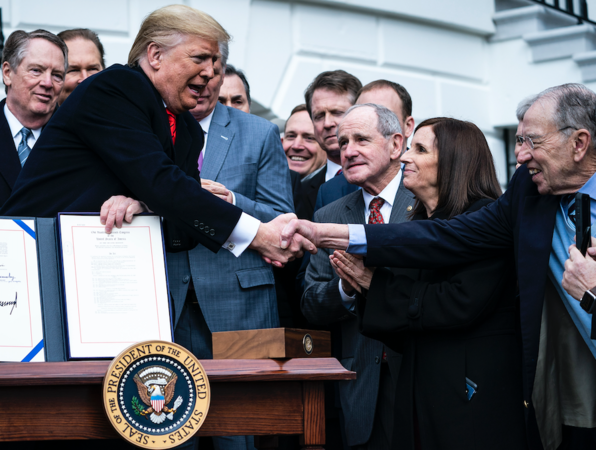Trump signs USMCA deal, revamping North American trade rules

WASHINGTON - President Donald Trump signed a revamped trade agreement with Canada and Mexico into law on Wednesday, achieving his pledge to rework the North American Free Trade Agreement even as he contends with the Senate impeachment trial.
The revised treaty, called the U.S.-Mexico-Canada Agreement (USMCA), creates new environmental and labor standards for the countries, while also giving farmers greater access to Canadian markets and ensuring car companies have to use a higher share of parts within North America in their production, among other changes.
Mexico has already ratified the deal, and Canada is expected to formally approve it very soon.
Trump was able to win congressional support for the deal because of substantive changes he made to win support from Democrats and labor unions. But no Democratic lawmakers were present at the signing ceremony. U.S. Trade Representative Robert Lighthizer had told lawmakers he wanted Democrats to be included at the event but was unsuccessful in doing so, according to two people familiar with the talks granted anonymity to share private conversations. A spokesman for USTR did not immediately respond to request to comment.
At the ceremony, Trump hailed the "momentous, historic, and joyous occasion" and said the deal would eliminate outsourcing to keep jobs in America. Vice President Mike Pence and Jared Kushner, an adviser and the president's son-in-law, were among those in attendance. Dozens of Republican lawmakers also attended.
Trump also called the original NAFTA a "catastrophe" and said revamping the deal was the reason he ran for president and abandoned the "beautiful, simple life of luxury I lived" as a private businessman and celebrity.
"This is a cutting edge, state-of-the-art agreement that protects and defends the people of our country," Trump said.
Bipartisan majorities in Congress approved the trade deal by wide margins, with the package sailing through the Senate by an 89 to 10 vote margin. Democrats touted a series of changes they helped secure in the pact to beef up its labor and environmental protections in months of talks with Lighthizer.
"This is a celebration of what Democrats were able to secure," said Rep. Rosa DeLauro, D-Conn., a longtime free trade skeptic who endorsed the deal, in a press call on Wednesday. "We secured positive changes on environmental standards, labor standards, and access to medicine."
It is unclear if the trade deal will reverse decades of damage to America's industrial sector. U.S. factory payrolls dropped by close to 6 million after the original 1994 NAFTA and the entrance of China in 2001 to the World Trade Organization. The USMCA is likely to only add 50,000 of these jobs, the International Trade Commission has found.
The agreement also scrapped the original NAFTA's Investor-State Dispute Settlement system, which gave corporations extensive authority to sue foreign governments forced to comply with business-friendly panels.
"That's a dramatic change," said Lori Wallach, a trade expert at Public Citizen, a left-leaning advocacy organization.
The revised North American trade came just weeks after Trump signed a partial trade deal with China, and White House officials have said the hardball tactics that the president has used to extract changes from U.S. trade partners have proven effective.
The North America deal was supported by the AFL-CIO, one of the largest unions in the country, as well as leading business groups such as the U.S. Chamber of Commerce and Business Roundtable. Other union groups, such as International Association of Machinists and Aerospace Workers, opposed it. The United Food and Commercial Workers International Union also criticized the agreement for not including "country-of-origin labeling" intended to ensure food safety and prevent foreign companies from skirting food production standards.
Many of the nation's leading environmental organizations, including the Sierra Club and the League of Conservation Voters, also blasted the agreement as failing to ignore climate change and helping "corporate polluters."
The vast majority of the Democratic caucus, as well as most of the leading Democratic presidential candidates, backed the effort. Sen. Bernie Sanders, I-Vt., voted against the package, citing the opposition of environmental groups and the Machinists Union.





